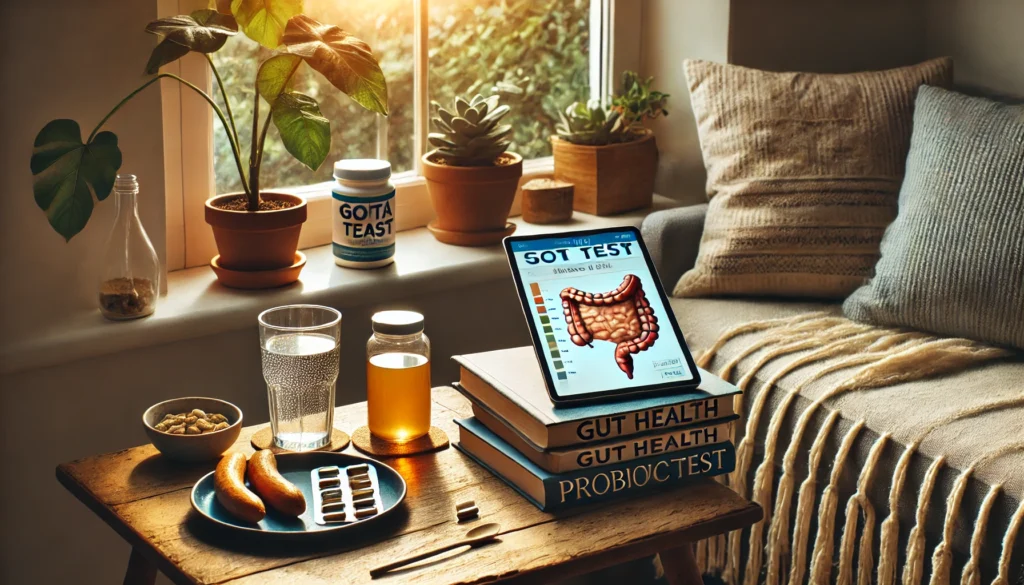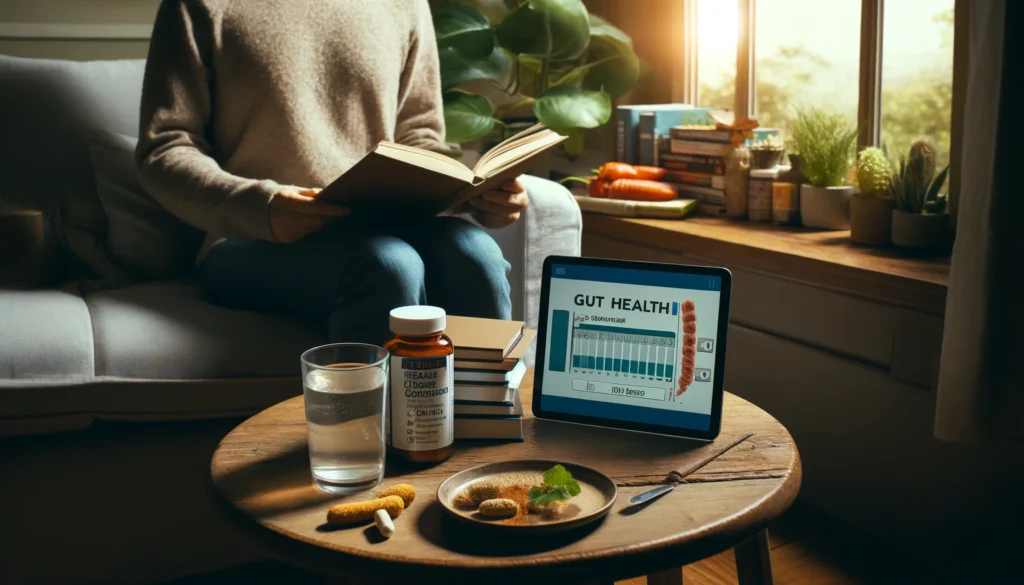Introduction
In today’s fast-paced and highly industrialized world, where stress, processed foods, environmental toxins, and sedentary lifestyles are increasingly the norm, the human gut is under constant assault. Gut inflammation, once thought to affect only those with specific gastrointestinal conditions, has now emerged as a silent epidemic touching every area of human health. From persistent bloating and abdominal discomfort to brain fog, skin rashes, joint pain, autoimmune flare-ups, and mood disorders, the symptoms of gut dysfunction ripple through the entire body.
You may also like: The Science of Gut Repair: How to Heal Leaky Gut Syndrome Naturally with a Proven Gut Healing Diet
If you’ve been struggling with vague symptoms or chronic health conditions that defy easy explanations, learning how to heal gut inflammation may be the key to unlocking lasting recovery. This isn’t just about digestive comfort—it’s about restoring immune function, stabilizing mood, enhancing energy, improving cognition, and reducing the risk of serious chronic illness. Inflammation in the gut is often the beginning of broader systemic issues, and addressing it is a foundational step in healing the body from the inside out.
In this comprehensive science-backed guide, we’ll explore what gut inflammation is, why it occurs, how it affects the entire body, and most importantly, how to reduce inflammation in the gut through sustainable lifestyle changes, nutritional strategies, and targeted therapies. You’ll learn how to get rid of gut inflammation by understanding root causes such as dysbiosis, leaky gut, food sensitivities, chronic stress, and environmental toxins. Whether you’re navigating mild bloating or a diagnosed condition like IBD, this article will provide you with a clear, empowering path to better gut health—and better overall wellbeing.

What Is Gut Inflammation?
Gut inflammation refers to an immune response that occurs in the gastrointestinal tract, typically involving the mucosal lining. It results from a combination of triggers—dietary irritants, pathogens, toxins, and stress—that provoke immune cells to release inflammatory mediators such as cytokines and interleukins. These substances initiate repair mechanisms, but when the cause of irritation persists, the inflammation becomes chronic and damaging.
Under normal conditions, the intestinal lining forms a barrier that allows nutrients to pass through while keeping harmful agents out. However, when inflammation becomes chronic, it can compromise the integrity of this barrier. This leads to increased intestinal permeability—a condition commonly known as leaky gut—where unwanted particles such as bacteria, toxins, and undigested food fragments cross into the bloodstream. This leakage incites immune overactivation, systemic inflammation, and can contribute to a range of conditions including autoimmunity, allergies, and neurological disorders.
Understanding how to heal gut inflammation begins with understanding its multifactorial nature. It is not simply a digestive issue—it is an immune, neurological, and metabolic challenge that affects every major system in the body.

Root Causes of Gut Inflammation
Chronic gut inflammation develops gradually, often beginning with minor irritants and escalating into a full-blown systemic issue. Pinpointing the root causes is essential if we want to understand how to reduce inflammation in the gut and support long-term healing.
Dysbiosis
Dysbiosis refers to an imbalance in the gut microbiome, the vast community of microorganisms that live in the digestive tract. A healthy microbiome protects against pathogens, aids in digestion, regulates immunity, and produces anti-inflammatory compounds like short-chain fatty acids (SCFAs). When beneficial bacteria are depleted—due to antibiotics, poor diet, stress, or environmental toxins—harmful microbes can take over. These opportunistic pathogens release endotoxins, irritate the gut lining, and promote chronic inflammation.
Restoring microbial balance is central to understanding how to get rid of gut inflammation. Strategies include removing harmful influences, replenishing good bacteria, and feeding them the right nutrients.
Leaky Gut (Increased Intestinal Permeability)
A compromised gut lining allows substances that should remain inside the gut to pass into the bloodstream. This condition, often called leaky gut, is strongly associated with chronic inflammation. It occurs when the tight junctions between epithelial cells are disrupted, often due to stress, food sensitivities, infections, or toxins.
Once the barrier is breached, immune cells are activated and begin attacking what they perceive as invaders. The immune response becomes dysregulated, triggering systemic inflammation that can affect the brain, joints, skin, and other organs.
Understanding how to heal gut inflammation requires strengthening this barrier through targeted nutrients and lifestyle changes that support epithelial repair and immune regulation.
Chronic Stress
The gut-brain axis links emotional stress to digestive health. Chronic psychological stress elevates cortisol levels, which weakens the gut lining, alters motility, suppresses immunity, and shifts microbial balance. Stress also increases gut permeability and promotes inflammation.
Effective gut healing protocols must include strategies for nervous system regulation, such as breathwork, meditation, sleep hygiene, and adaptogenic herbs. Without addressing stress, efforts to reduce inflammation in the gut often fall short.
Processed and Inflammatory Foods
Diet is one of the most powerful modulators of gut health. Processed foods, high-sugar snacks, alcohol, refined carbohydrates, and industrial seed oils all contribute to inflammation. These substances disrupt the microbiome, weaken the gut lining, and activate immune responses.
Certain common foods—especially gluten, dairy, soy, corn, and eggs—can trigger immune reactions in sensitive individuals. For many, eliminating these foods leads to immediate improvements in digestive symptoms, skin health, and energy.
Healing diets rich in anti-inflammatory whole foods, prebiotic fibers, fermented products, and phytonutrients are critical for long-term recovery.
Environmental Toxins
Exposure to pesticides, heavy metals, plasticizers (like BPA), and air pollutants can damage the gut lining, disrupt hormonal balance, and provoke immune dysregulation. Glyphosate, a widely used herbicide, is known to affect microbial diversity and gut permeability.
Detoxification strategies such as filtering drinking water, choosing organic produce, reducing plastic use, and supporting liver function are important elements in the effort to get rid of gut inflammation.

How to Heal Gut Inflammation: Science-Backed Strategies
Healing the gut involves a multi-step, holistic process that addresses both root causes and symptom relief. Each person’s path will be unique, but most successful approaches include the following elements.
Step 1: Remove Irritants
This includes eliminating inflammatory foods, stopping unnecessary medications that harm gut lining, treating infections like Candida or SIBO, and identifying food sensitivities. An elimination diet followed by reintroduction can help pinpoint specific triggers. Lab tests may also identify problematic microbes or hidden pathogens that need to be addressed.
Step 2: Restore Digestive Function
Many people with gut inflammation lack sufficient stomach acid, bile, or pancreatic enzymes. This impairs nutrient absorption and contributes to microbial overgrowth. Digestive support may include betaine HCl, ox bile, and plant-based digestive enzymes tailored to individual needs.
Step 3: Reinoculate the Microbiome
Probiotics and fermented foods can help restore microbial balance. Clinical strains such as Lactobacillus rhamnosus GG, Bifidobacterium infantis, and Saccharomyces boulardii have been shown to reduce gut inflammation and support immune health. Prebiotic fibers from vegetables, fruits, and certain supplements feed these beneficial bacteria.
Step 4: Repair the Gut Lining
Nutrients that support mucosal integrity include L-glutamine (an amino acid that fuels epithelial cells), zinc carnosine (to repair tight junctions), omega-3 fatty acids (anti-inflammatory), collagen peptides (for tissue healing), and herbs like slippery elm, marshmallow root, and aloe vera.
Step 5: Regulate the Nervous System
Healing the gut requires calming the sympathetic nervous system and enhancing vagal tone. Strategies include meditation, journaling, deep diaphragmatic breathing, yoga, laughter, and restorative sleep. Vagus nerve stimulation, either through breathwork or devices, can directly reduce gut inflammation.

Frequently Asked Questions
1. What are the first signs of gut inflammation that people should look out for?
Early signs of gut inflammation are often subtle and easy to overlook. These may include bloating, gas, inconsistent bowel movements, mild fatigue after eating, skin rashes, or increased sensitivity to certain foods. Over time, symptoms may progress to more noticeable issues such as joint pain, mood swings, brain fog, and difficulty concentrating. The tricky part is that many of these symptoms don’t appear digestive in nature, leading to misdiagnoses or symptom suppression. Being proactive in identifying and addressing these early warning signs is key to preventing more severe damage.
2. Can gut inflammation lead to autoimmune disease?
Yes, chronic gut inflammation is strongly linked to the development and progression of autoimmune diseases. The gut lining plays a key role in immune system training. When the barrier is compromised, foreign particles can enter the bloodstream and trigger immune responses that begin to target the body’s own tissues. Conditions such as rheumatoid arthritis, Hashimoto’s thyroiditis, lupus, and multiple sclerosis have all been associated with gut permeability and microbiome imbalances. Healing the gut can reduce autoimmune flare-ups and may help prevent further progression.
3. How does stress worsen gut inflammation?
Stress impacts gut health through the gut-brain axis—a communication network between the central nervous system and enteric nervous system. Chronic stress elevates cortisol levels, which impairs the production of digestive enzymes, increases gut permeability, and weakens the immune barrier. It also changes the composition of the microbiome by reducing beneficial strains and allowing harmful microbes to flourish. This combination creates a perfect storm for chronic inflammation. Managing stress through mindfulness, breathwork, nature exposure, and social connection is essential for full recovery.
4. Are probiotics effective in reducing gut inflammation?
When chosen carefully, probiotics can be highly effective in modulating inflammation. Specific strains like Bifidobacterium longum, Lactobacillus plantarum, and Saccharomyces boulardii have been shown to reduce markers of inflammation, enhance epithelial repair, and regulate immune activity. However, not all probiotics are beneficial for every individual. Some people may react negatively to certain strains if they have SIBO or histamine intolerance. It’s important to select evidence-based strains and introduce them gradually as part of a broader healing protocol.
5. What foods should I avoid if I have gut inflammation?
If you’re dealing with gut inflammation, it’s important to avoid foods that are known to irritate the gut lining or provoke immune responses. These include processed foods, sugar, alcohol, trans fats, gluten, conventional dairy, soy, corn, artificial sweeteners, and industrial seed oils like canola and soybean oil. Even healthy foods like eggs or nightshades may trigger symptoms in some people. Keeping a detailed food and symptom journal and working with a practitioner can help you identify your personal triggers more effectively.
6. How long does it take to heal gut inflammation?
Healing timelines vary based on the severity of the condition, the underlying causes, and the consistency of treatment. Mild inflammation may begin to resolve within a few weeks of dietary changes and supplementation. Moderate to severe cases may require several months of consistent intervention and professional guidance. True healing often occurs in layers, with improvements unfolding gradually. Patience, tracking progress, and being willing to adjust your approach are key to success.
7. What role does sleep play in gut inflammation?
Sleep is a vital regulator of immune function, hormone balance, and microbiome health. Poor or irregular sleep disrupts circadian rhythms, weakens the gut barrier, increases cortisol, and reduces microbial diversity. Sleep deprivation has been shown to increase markers of systemic inflammation and worsen gut permeability. Prioritizing consistent, quality sleep—ideally seven to nine hours per night—can significantly enhance gut healing efforts.
8. Can children experience gut inflammation, and how is it treated?
Children can absolutely experience gut inflammation, though symptoms may differ from adults. Common signs include eczema, behavioral issues, frequent colds, constipation, or abdominal pain. Causes often include antibiotics, processed foods, food sensitivities, and stress. Treatment focuses on restoring the microbiome with child-friendly probiotics, eliminating inflammatory foods, and supporting the gut lining with nutrients like zinc and glutamine. Early intervention in children can prevent long-term health complications and support better brain development.
9. Is intermittent fasting helpful for reducing gut inflammation?
Intermittent fasting may benefit gut health by giving the digestive system a rest and promoting autophagy—a process that removes damaged cells. It can help regulate insulin, reduce systemic inflammation, and improve microbiome composition. However, fasting is not appropriate for everyone, especially those with adrenal fatigue, eating disorders, or blood sugar instability. If done mindfully, fasting can be a powerful adjunct to other gut-healing strategies, but it should be customized to individual needs and tolerance.
10. What tests can diagnose gut inflammation?
Several functional and clinical tests can help identify gut inflammation. Stool tests such as GI-MAP or comprehensive digestive stool analysis can measure calprotectin, secretory IgA, and microbial composition. Blood tests may include C-reactive protein (CRP), zonulin, and food sensitivity panels. Breath tests can detect SIBO, while endoscopy or colonoscopy may be used for more advanced conditions. Working with a knowledgeable healthcare practitioner can help determine the right tests based on your symptoms and history.

Conclusion
Healing gut inflammation is one of the most transformative things you can do for your health. The gut is not just a digestive organ—it’s a dynamic, living ecosystem that influences your immune system, brain function, hormone balance, and longevity. Chronic inflammation in the gut disrupts this harmony and quietly contributes to disease, discomfort, and decline.
Fortunately, science now offers us clear, actionable strategies to repair this damage. By identifying root causes, removing irritants, restoring digestive integrity, and supporting microbial balance, you can begin to reverse inflammation at the source. Equally important is addressing lifestyle factors like stress, sleep, and environmental exposures that perpetuate the inflammatory cycle.
Whether you’re dealing with mild discomfort or a complex diagnosis, know that healing is possible. With the right information, consistent action, and compassionate support, your gut can recover, rebuild, and return to its central role as the guardian of your health. The journey may be layered, but it’s worth every step—for your energy, your mind, and your life.
Was this article helpful? Don’t let it stop with you. Share it right now with someone who needs to see it—whether it’s a friend, a colleague, or your whole network. And if staying ahead on this topic matters to you, subscribe to this publication for the most up-to-date information. You’ll get the latest insights delivered straight to you—no searching, no missing out.
Further Reading:
Your Digestive System: 5 Ways to Support Gut Health
Signs of an Unhealthy Gut and What to Do About It
Elucidating the role of diet in maintaining gut health to reduce the risk of obesity



